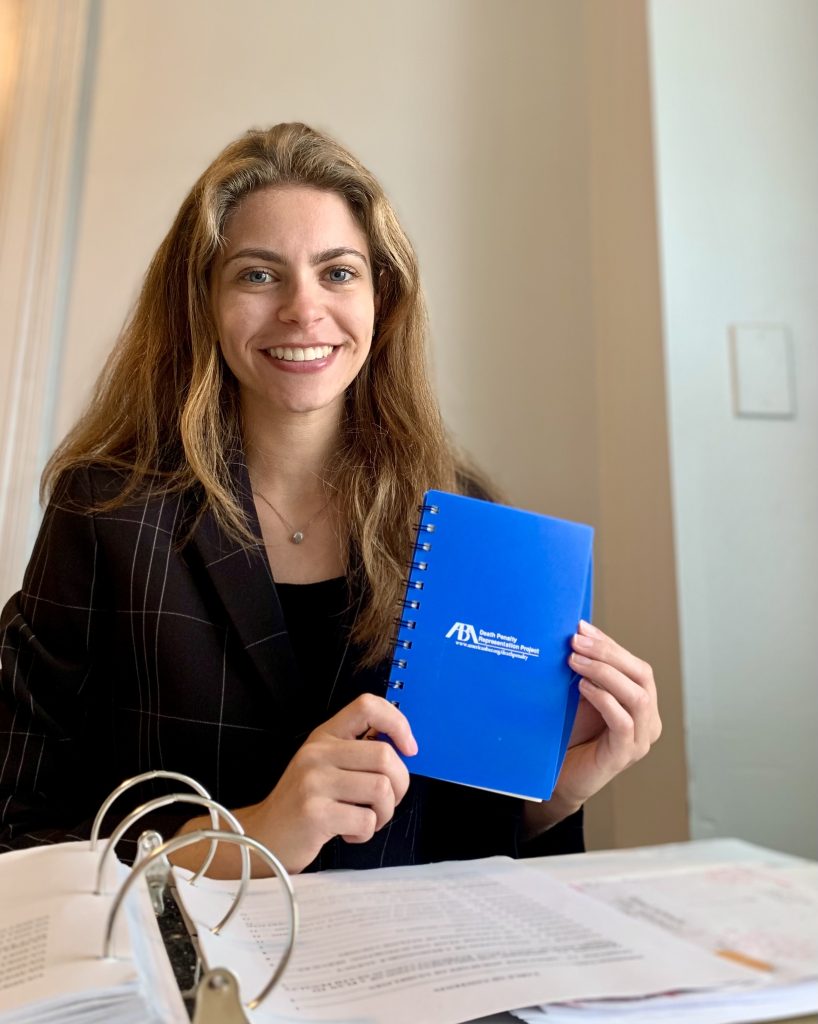
Metz’s interest in criminal justice reform and civic impact began in the summer of 2021 when she interned for the U.S. Attorney’s Office in Springfield, Massachusetts. During her stint at the office during the summer and fall, Metz “got to see the ins and outs of the entire prosecution system.”
Her experience at the U.S. Attorney’s Office in Springfield fueled her desire to seek another internship in the civic impact field the following summer. “I wanted to see the flip side and get exposure to defense,” Metz said.
After unsuccessfully applying to over 30 internships and reaching out to over 15 other organizations, law clinics, and nonprofits, Metz sought alternative routes to finding an internship.
Frustrated with the lengthy application and interview processes that seemed to produce little results, Metz sought help from Victoria Wilson, Director of Early Career Exploration. As a three-time Houston Program recipient, Metz was familiar with the internship search process and the resources available to her with Wilson’s help. Together, Metz and Wilson discussed the importance of reaching out to organizations rather than just relying on Handshake. “It’s about cold calling and cold emailing people. A lot of the time, these opportunities are not posted anywhere online, and you just have to reach out,” Metz said.
A simple Google search led Metz to The American Bar Association (ABA), an association whose initiative is to “serve equally our members, our profession and the public by defending liberty and delivering justice as the national representative of the legal profession.”
After emailing the organization inquiring about interning for a number of their departments, Metz was met with open arms by ABA’s Death Penalty Representation Project. Following the email interaction, Metz was asked to send a cover letter, resume, and writing samples and complete an interview via Zoom. “Luckily, [I was] able to find [an] internship that’s allowed me to get more exposure and experience to the capital punishment realms,” Metz said.
In a week, Metz was offered the undergraduate internship position at the organization. Traveling to Washington DC for her primarily in-person internship, on Monday, May 23, Metz began her work at the ABA.
During the 12-week program, her internship consisted of various tasks that promoted providing effective counsel to people facing the death penalty or people who are already on death row.
“So far as the organization is concerned, we get letters from inmates on death row that write to us, some of them already have counsel, [and] some of them are requesting a new attorney. Some of them are like, ‘My counsel’s so bad, can you get me a new one?'” Metz explained how most of her work is finding law firms to outsource these cases. Mainly Metz searched for law firms and attorneys who would take on the cases pro bono.
“A lot of the work I do is doing research on big law firms all over the country, reviewing their pro bono work, their racial justice initiatives, their DEI work, and getting in touch with their pro bono coordinators in order to recruit potential attorneys for specific cases. [When] we get all these inmate letters, we look at their case files, and we put together, or we write summaries or pitches, where we try to paint their case in a really good light, present mitigating factors, and why they don’t deserve a death sentence. And then we pitched those cases to attorneys.”
Another responsibility assigned to Metz is to update the ABA’s 178-page manual titled “Guidelines for the Appointment and Performance of Defense Counsel and Death Penalty Cases.” The manual, which provides guidelines for what defense attorneys should do when they take on a case where the death penalty is at stake, was last updated in 2003. Metz used new Supreme Court rulings, legal scholars, law review articles, and legal databases to “find cases and articles that would help update [ABA] guidelines, and answer these unanswered questions on how to represent a client effectively when the death sentence is at stake.”
Metz’s final endeavor as an undergraduate intern is to write blogs for the association. Metz shared information with the death penalty representation community and other lawyers by researching and documenting new developments. “The last article I wrote was about a Supreme Court ruling called Andrews versus Texas. [There are] all these Supreme Court cases this year that came out that really hurt people on death row and their ability to appeal their convictions. So I’ve been writing blogs on that.“
While Metz cultivated a great deal of research and support for inmates facing the death penalty, she described the internship experience as an “exploration” opportunity to work as a lawyer at a big firm that takes on death penalty cases pro bono. Although she would like to “fight the good fight,” Metz worries that the high caseloads “would just be way too hard on [her] emotionally. In an ideal world, it sounds great. But it is hard. I don’t know if I’m cut out for it,” Metz said.
While Metz is uncertain whether or not she can sustain a career in the field, she is sure that she “definitely [wants] to go to law school.”
If you need help finding an internship, please consider speaking with an advisor. You can schedule appointments on Handshake.
